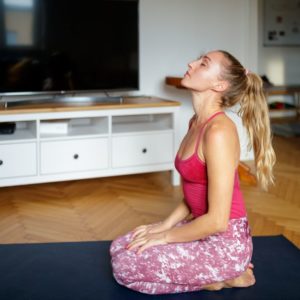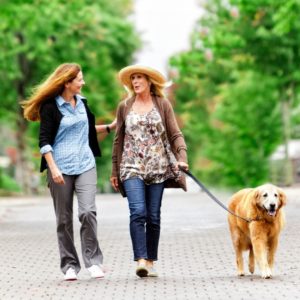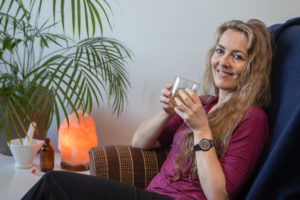A natural health guide to surviving lockdown!

It can be easy for our health and wellbeing to end up “on hold” when we’re busy coping with the upheaval of a pandemic and lockdown, but it’s important to prioritise supporting our physical and mental health during this time as best we can. Naturopath, Sonya Byron, shares her top 12 tips for surviving, and even thriving, during lockdown.
1. Create a healthy, daily routine
Humans are creatures of habit. The regularity, repetition and rhythm of a daily routine can help us to create habits that are healthier. In particular, a daily routine that aligns with the rhythms of nature can be very conducive to good health. To begin, aim to spend 15 minutes in nature – in the sunshine and fresh air – first thing in the morning. This will help to create a healthy circadian rhythm, ensuring more energy during the day and a better quality sleep at night.
For the remainder of the day, if you’re an essential worker continuing with your regular employment, we thank you! If you’re taking time away from work, you’re working from home, you’re supervising online learning for your children, or some combination of the above, try to continue with your regular daily routine as best you can. Some people find it helpful to shower and dress professionally in the morning, and to start and finish work at the same time each day, as if they were still going to the office. This can help to create clear boundaries between work and home life, and to prevent work from encroaching on your personal time (and vice versa). If this doesn’t suit you and your situation, however, consider at least establishing some regular activities at set times every day, for example, a half hour walk on your lunch break at 1pm, or packing up and putting away your work materials and boiling the kettle for a cup of herbal tea at 5pm. This will help to create a sense of structure, and to reduce the feelings of stress that can arise from the feeling of being endlessly “stuck at home” all day.
2. Breathe!

Modern life is stressful at the best of times and more so during a pandemic, and at times we may become so stressed that we forget to breathe deeply. Uncontrolled stress can have an enormous impact on our physical, mental, emotional and spiritual health and wellbeing. It may not be possible to reduce our stressors, but consciously focussing on our breath may help to reduce their impact. Begin by pausing and taking a few deep breaths whenever life feels overwhelming. Or explore the power of the breath further through meditation or Yogic breathing (pranayama). The simplest of all pranayamas is Sukha Pranayama (literally, easy or pleasant breath). Sit in Vajra asana – the Thunderbolt posture if you’re familiar with Yoga – or in any comfortable seated position. Place the palms of your hands on your legs, or fold your palms together and rest them in your lap. Breathe slowly and deeply, in and out, breathing in for a count of at least six, and out for an equal count. Begin with a minute or two, and slowly build up until you’re breathing deeply for at least five to ten minutes per day. You’ll be pleasantly surprised by how quickly this simple practice can restore a sense of peace and calm in the midst of all the chaos!
3. Hydrate
Many people are dehydrated, which can exacerbate pandemic-induced feelings of fatigue, stress, low mood and more. Individual requirements vary, but as a general guideline, aim to consume a minimum of 30mLs fluids per kg of body weight per day e.g. if you weigh 65kg, aim for at least 2L fluids per day. Good choices include purified tap water, sparkling mineral water, and herbal tisanes or teas. Add sliced citrus, melon or kiwifruit, crushed berries, or cucumber and mint to your water for added flavour. Many people simply forget to drink, and if this applies to you, it may help to place some prompts in your environment to remind you, for example, filled water jugs or tea cups wherever you spend the most time in your home.
4. Eat real food

Eating a wide variety of fresh, unprocessed, whole foods is one of the foundations of good health. A Mediterranean-style diet, with fresh vegetables and fruits, beans/peas/legumes, nuts and seeds, and whole grains forming the basis of every meal (with moderate amounts of seafood/poultry, eggs and dairy), is one of the best choices for physical and mental health during the lockdown and beyond. Choose extra-virgin olive oil for cooking and salad dressings, and add anti-inflammatory and antioxidant-rich herbs and spices, such as ginger and turmeric, to every meal. Warming and stimulating broths, soups, stews, and slow cooked meals made with onions, garlic, chilli and other herbs, easy to digest proteins, such as salmon, and lots of fresh vegetables are great for supporting immune and general health during this time. Be sure to include fresh fruit every day as well, especially berries and citrus, either eaten whole, juiced (with pulp), or added to a protein rich smoothie.
Following these “real food” guidelines above, and avoiding excess sugar, alcohol and ultraprocessed “junk food” during lockdown will help to reduce blood glucose fluctuations that can significantly contribute to feelings of fatigue and stress, as well as to reduce excess weight gain.
5. Consider supplementation
Herbal and nutritional supplements are no substitute for a healthy diet and lifestyle. However, targeted supplementation can at times be very beneficial to address a specific health concern or to support immune and general health and wellbeing. Immune-supportive nutrients such as vitamin C, vitamins A and D, and the mineral Zinc, and herbs such as Echinacea, Elderberry, Andrographis, Astragalus, Olive leaf, the Ginsengs, Withania and medicinal mushrooms such as Reishi and Shiitake may be particularly beneficial during this time. See a naturopath, herbalist or nutritionist for personalised advice, particularly if you have a diagnosed medical condition or take pharmaceutical drugs. Avoid self-prescribing supplements, especially if you take medications, as many herbs and nutrients have the potential to interact with pharmaceutical drugs.
6. Move

Aim to be physically active for a minimum of 90 minutes per day, most days of the week, during lockdown. Start slowly if you’re not already active, and add 5 minutes per day (if you haven’t exercised recently or you have a diagnosed medical condition, check in with your GP or health care practitioner before you begin). Choose from a variety of physical activities that you already enjoy to develop your endurance, strength, balance and flexibility. Or try something new. Walking or running, strength training with weights, Yoga, dancing or gardening – the best exercise is whatever you enjoy enough to do regularly!
Exercising in nature has been proven to be particularly beneficial for mental health, so try combining the two and making the most of our beautiful Blue Mountains environment by going for a bushwalk! Of all the places in the world to be in a lockdown, this is probably one of the best 🙂
7. Reduce media exposure
While Gladys’ 11am briefing may have become a daily pandemic ritual of sorts for many people across the state, excessive exposure to the media and the endless focus on climbing case numbers and hospitalisations can heighten feelings of stress and anxiety. Consider what you consume daily – and I don’t mean food! How much of it is positive? Aim to avoid excessive media exposure. I recommend reading the news once per day and during the day only, never first thing in the morning or last thing at night. You may wish to avoid or limit social media for the sake of your mental health too. If you choose to use it (it can be a great means of staying in touch with family and friends during this time), consider “unfollowing” any individuals or groups whose posts cause you distress, be sure to verify that any pandemic-related content is from a reputable source, and commit to some dedicated “screen free” time every day, particularly if your work already requires you to sit at a computer. For example, try switching your phone to aeroplane mode one hour before bed.
8. Learn something new
Learning something new is one way to alleviate the boredom that many people are experiencing as a result of the lockdown. It can give us something positive to focus our attention on if we have more time than usual, and help us to avoid that uncomfortable feeling of too much time being devoted to Netflix! Is there something that you’ve always been curious to learn more about? Why not try a MOOC – a Massive Open Online Course? Head to a search engine/review site like Class Central, and you can search through literally hundreds of free online courses on every subject you can think of, many of which are offered by the world’s top universities. If this doesn’t appeal, anything that keeps your brain active and engaged such as reading, listening to podcasts, learning a new language, or learning practical skills such as baking, gardening, or knitting is a great idea to pass the time. And don’t forget the importance of the arts too – many amazing dancing, drumming, music, painting and other art teachers are offering online classes and would love your support.
9. Connect

Loneliness is considered to be one of the greatest public health challenges of modern times. We all need a tribe – a close group of family and/or friends to support us through life’s ups and downs. Consciously cultivate your connections with loved ones during the lockdown by aiming to chat with a family member or friend every day. In person meetings may not be possible at present, but connecting by phone or online is possible and can help us to maintain social connections. Aim to grow your social circle too – try joining an online class, club or social group to meet new people and make new friends. And don’t forget the importance of connecting with animals and nature as well! Your local animal shelter or rescue group no doubt has the perfect new furry family member waiting if this is a possibility for you.
10. Be kind and care for the community
One of the best ways to reduce the stress of the lockdown is to focus on caring for others in our community. Many elders in particular are isolating at home and are lacking regular care and support visits from family and friends. Many working age people have lost jobs and income and are struggling to cover food, rent and other expenses, or are juggling the dual responsibilities of working from home and supervising home learning. And many children are missing going to school and spending time with their teachers and friends each day. Do your best to check in with family, friends and neighbours to see what practical support you can offer – even if it’s just picking up a carton of milk for an elderly neighbour to save them a trip to the shops. Donate to local food banks, homeless shelters and community support organisations if you can afford to. Or get creative and think about how you could bring a bit of lockdown cheer to the children in your local area. I’ve been inspired on my daily walks by how many people are making a real effort to do this, with everything from free street libraries, art, craft and activity packs, toy libraries, “rainbow”, “where’s Wally”, teddy and treasure hunts, and more being shared.
11. Sleep well

One in three Australians are chronically sleep deprived, contributing to fatigue, stress, overeating, inflammation and pain, immune dysfunction and more. Sleep researchers agree that most people require 7-9 hours quality sleep per night to feel their best and function well during the day. In the context of a pandemic and lockdown, therefore, a lack of sleep can only make any feelings of fatigue and stress you’re experiencing worse. So aim to allow yourself 9 hours of quality sleep per night, and if you need less than this, you’ll naturally begin to wake up prior to your alarm. Try setting yourself up for a successful night’s sleep by designing yourself a relaxing pre-bedtime routine. Try dimming the lights when the sun goes down, ditching the electronics for the evening, and treating yourself to a warm bath or shower, a good book, and a cup of chamomile tea.
12. Reach out for mental health support
None of us have ever experienced a pandemic and extended lockdown before. It’s completely normal to have days where you feel stressed, anxious and even completely overwhelmed by events beyond your control (I’m yet to meet anyone who hasn’t experienced days like this!). If you’re regularly feeling anxious or down about what’s happening and would like some support for your mental health, please book an appointment to see your GP. You may be eligible for a mental health care plan, which will entitle you to up to 20 subsidised visits with a mental health care professional per year. If you’d prefer to access your own support, there is a comprehensive list of mental health services, resources and contacts provided by NSW Health. Many of these services are available for free or at low cost, and can be conveniently accessed online or by phone from home.

One of the Co-op’s in store practitioners, Sonya Byron, is a naturopath and yoga teacher in clinical practice at Lower Mountains Health & Healing in Blaxland. Prior to her career in natural health, she earned her living as the owner/farmer of Good Karma Farm, a sustainable two-acre organic farm producing 60 different vegetable and herb crops. She believes that fresh, healthy, home grown food is one of the foundations of good health, and she’s passionate about empowering people to care for their health (and to save money, time and the planet in the process) by learning how to grow and preserve their own food, and how to make their own simple herbal and nutritional remedies for common health complaints. For further information, visit Sonya Byron Plant Medicine at sonyabyron.com.au
(The information in this article is for educational purposes only and is not intended as a substitute for health care advice. Please consult your friendly local naturopath, herbalist or other health care practitioner for personalised advice, particularly if you have a diagnosed medical condition or take pharmaceutical medications).


